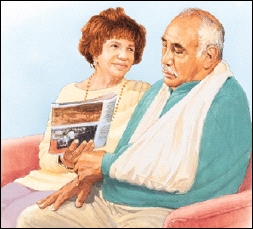Aphasia: Improving Communication
Aphasia: Improving Communication
Aphasia happens when a part of the brain that processes language is damaged. A speech and language therapist (an expert trained in speech and language rehabilitation) will work closely with the patient and family to help the patient communicate.
Speech and language therapy
During rehabilitation (rehab), the therapist may do the following:
Use objects and flash cards to help improve naming skills.
Use alternative means of communicating, such as writing, gesturing, or other visual aids when necessary.
Ask the person to follow commands and answer questions about stories or articles.
Help the person find ways to work around lost language skills. For example, the person may need to use a thumbs-up or eye blinks in place of “yes” or “no.”
Assist the person in conversational skills, such as turn-taking during a discussion and expressing thoughts. This may be done during group therapy.
You can help
If your loved one has aphasia, the tips below may make communicating easier:
Speak slowly and clearly. Use common words, but don’t “talk down.”
Speak in simple sentences. Stick to one idea and one action.
Give the person time to understand and to respond.
Do not ignore the person. Keep him or her informed and involved.
Do not pretend to understand if you don’t.
Updated:
October 16, 2017
Sources:
Approach to the Patient with Aphasia. UpToDate
Reviewed By:
Kacker, Ashutosh, MD,Taylor, Wanda L, RN, Ph.D.

